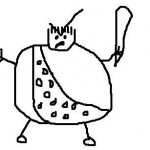
A famous tagline from the film Paradise Recovered, uttered by skeptical hippie Gabriel, goes like this:
The point on the ideological spectrum at which far-left bohemians and right-wing fundamentalists meet is a health food store.
There’s really something to that. Homesteading, home birth, homeschooling, home-grown food, and homemaking are all crossover cultural practices that appeal to anyone disillusioned with the predictable rotation of urban or suburban life. There’s something really appealing about living close to nature, eating whole foods, saving money by being crafty, and enjoying “wholesome” activities like gardening and raising animals. Many evangelical-fundamentalists, provided a certain level of financial security, have truly beautiful homes that do create the atmosphere of peace that magazines like Above Rubies celebrate.
There issomething incredibly relaxing about slipping off the grid and out of the rat race and getting your fingernails dirty. Rejecting the cycle of overtime work and competitive overspending is a genuinely good idea. As a college and (now) graduate student, I became aware of the hectic pace of the real world. Although the stereotype of college students doesn’t imply a connection with reality, those of us who go to graduate school typically broke our backs in pursuit of the grades we needed to apply – and some, like me, worked college jobs and led student groups and spoke at student conferences. I don’t pretend that there was nearly as much pressure on undergraduates as there is on postgraduate students or workers, but I’ve found that the pace just gets faster with every year. There is a perpetual sense of urgency: there are no jobs, so make sure you’re among the ten percent of your graduating class who actually work in their intended fields. Be the best or you’re screwed! Not to mention little things like utility bills, child care, car maintenance, health issues and random disasters that punch holes in your bank account.
I applaud the culture I grew up in for rejecting the frantic pace of the corporate-academic-industrial world. For all the problematic ideas about family and the home espoused by the Christian patriarchy movement, it does promote living from a more centered place. Men and women are both supposed to put their families first – even though the movement tells men that they do this by providing financially and women by running the home. In this culture, being a cutthroat executive who never comes home is almost as frowned upon for a man as it is for a woman. Obviously, there are huge drawbacks, but that’s for my next post, on “the bad”!
My mother was and is a brilliant homemaker. Our house was always tasteful, practically spotless and full of real character. My mom loved to shop for antiques, so our furniture was delightfully mismatched. She loved bright colors, so we started to paint things ocean blue and accent bland rooms with ruby red. We covered our walls with musical instruments and shelves full of souvenirs. The house always smelled like fresh air. When I got the idea, as a teenager, to redesign my room to look like a Japanese teahouse, my mother was totally on board! I have a lot of peaceful memories of waking up to the sound of my mother pushing furniture around and redecorating, or just cleaning. To this day, the first thing I do when I get up is scan my house for clutter and mess and clean it up. My mother took pride in the beauty and comfort of her home and her garden, and I’ve inherited that pride.
My mother was and is an excellent cook. My “training” as a homemaker involved learning old Italian family recipes and experimenting with new ones. My mom and I put together an elaborate dinner using the American Girl cookbook once, and I became a master of mashed potatoes. I didn’t realize until I went to college how unusual it was that I grew up eating mostly fresh, healthy foods. We used the microwave mainly for reheating things, and my mother made sure we could all count on a dinner made up of protein, starch and green vegetables. I rarely drank soda or ate candy, although we did have our occasional pizza dinners and holiday treats. America is saturated in sugar, salt and starch, so the emphasis on health and good, real food was a legitimate perk to the evangelical-fundamentalist lifestyle.
Obviously, none of these things – gardening, homemaking or cooking – are unique to evangelicals or fundamentalists. But the truth is that they’re really hard to reclaim when both heads of a family work full time. I don’t endorse forcing women to stay at home, not at all, but I would like to see a world in which 40 hours was the maximum, not minimum, requirement for a full-time professional position. I no longer have more than twenty minutes to cook anything, so I don’t get to make homemade tomato sauce very often. I have adapted some meals to the crock pot (such as whole roasted chickens, which come out amazing after a little butter and spices). But my meals these days tend to focus on doing one thing well: roasted vegetables with cheese, or roasted chicken with some carrots thrown in the crock pot. I’m learning how to adapt to the style of cooking that doesn’t take all day, and I’m eating much better this year than I have since going to college. But it’s a steep learning curve when you’re used to having two or three hours to put together the perfect meal, and no other pressing business to distract or hurry you.
I also have had to give up some of my standards for house-cleaning. I don’t vacuum nearly as often as I want to. It’s just not reasonable. Keeping a house to my mother’s standard would leave me perpetually exhausted, either working or cleaning. Do I miss carpets that aren’t covered in dog and cat hair? Yes. Do I miss them enough to quit my program and be a stay-at-home wife? Not for a minute.
I think I took away some really good things from my “wholesome” upbringing: learning to express my creativity by creating an inviting home, taking pride in the cleanliness and order of my home, being at peace with nature and enjoying cultivating a garden, having high standards for the health and quality of my food. However pressed for time I am now, and however triggering it can be to find myself in the kitchen, I think those things are worth holding onto.











